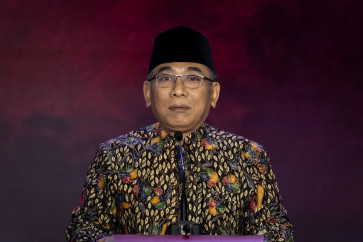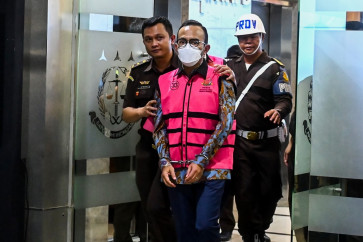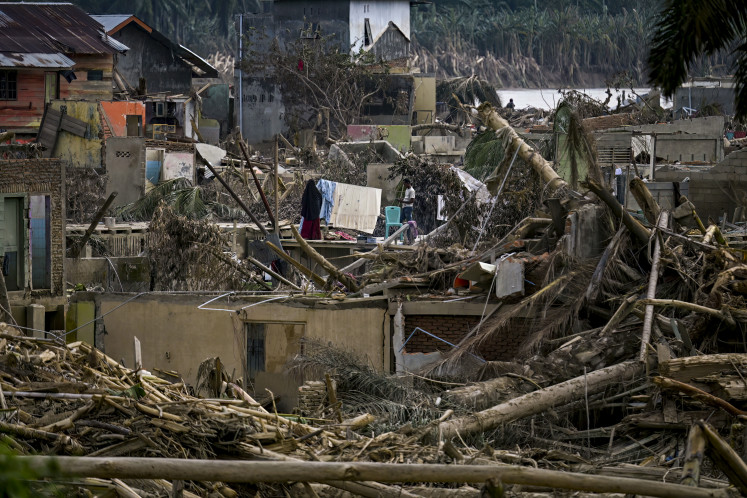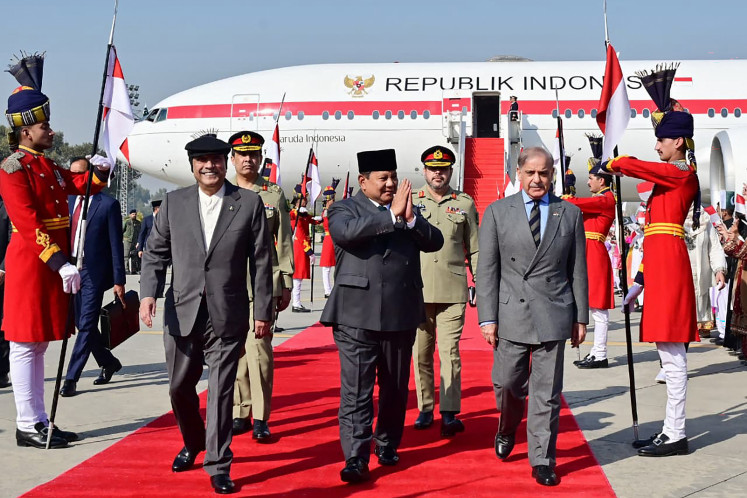Popular Reads
Top Results
Can't find what you're looking for?
View all search resultsPopular Reads
Top Results
Can't find what you're looking for?
View all search resultsJava 1 power plant project finally a done deal
The power of teamwork: PLN president director Sofyan Basir (left), Pertamina president director Dwi Soetjipto (center) and Jawa Satu Power president director Ginanjar display a gesture of unity after signing the power purchase agreement (PPA) for the Java 1 combined-cycle power plant in Jakarta on Tuesday
Change text size
Gift Premium Articles
to Anyone
T
span class="caption">The power of teamwork: PLN president director Sofyan Basir (left), Pertamina president director Dwi Soetjipto (center) and Jawa Satu Power president director Ginanjar display a gesture of unity after signing the power purchase agreement (PPA) for the Java 1 combined-cycle power plant in Jakarta on Tuesday. The power plant, which will cost US$1.8 billion to build, will strengthen electricity supply for Java and Bali. (Antara)
Dwi Soetjipto, state energy firm Pertamina’s president director, could not hide his relief when giving the opening remarks on Tuesday about a power purchase agreement (PPA) signing for Southeast Asia’s biggest combined-cycle power plant (PLTGU), the Java 1 project.
Pertamina and state-owned electricity provider PLN have gone through daunting negotiations over the past few months following a prolonged disagreement over the requirements needed for the facility, including the internal rate of return (IRR), bankability and gas supply.
Dwi acknowledged that PLN had been a tough partner to negotiate with, even compared to its global counterparts in various energy projects. However, both companies had managed to set aside their egos to keep the project on track.
“This project has taught us a lot in that we have to be willing to see things from the other’s point of view. If I were in PLN’s position, I might act the same way,” Dwi said.
It all started on Oct. 26, 2016 when PLN signed a letter of intent (LoI) that officially announced a consortium consisting of Pertamina, and Japan’s Marubeni and Sojitz Corporation as the winner of the Java 1 project tender.
The consortium was obliged to sign the PPA within 45 days after the announcement. However, Pertamina reportedly went in a different direction in the process, insisting PLN buy 92 percent of the plant’s electricity-production capacity, even though the request for proposal (RFP) for the project had stated that PLN would only provide an availability factor (AF) of 60 percent.
The original figure was seen as a burden, leading to an unfeasible IRR. “Now, we have adjusted the calculation for the IRR,” Dwi said, adding that the Pertamina-led consortium also agreed to comply with the 60 percent AF.
As a result, PLN officially signed on Tuesday the PPA with Jawa Satu Power, a special purpose company formed by the consortium to develop the plant in Cilamaya, Karawang, West Java, with total investment of around US$1.8 billion.
The plant, slated for construction within the next six months and expected to be complete in 2020, will have a total capacity of 1,760 megawatts (MW), 10 percent more than initially planned. It will supply the electricity to PLN within 25 years under the PPA with a price of 5.5 US cents per kilowatt-hour (kWh), considering the gas price will stand at around $5.3 per million British thermal unit (mmbtu).
“PLN is putting high hopes on the Java 1 power plant, which is expected to strengthen supply to the Java-Bali electricity network to anticipate the burgeoning growth of electricity demand by the public,” PLN president director Sofyan Basir said.
The plant will need 20 to 21 cargo loads of liquefied natural gas (LNG) to reach 60 percent of its operating capacity. The Energy and Mineral Resources Ministry has agreed to allocate 16 cargo loads of LNG for the facility, with an additional six to eight more loads if needed.
“Gas supply is no longer a problem for us. Nonetheless, we are still working on signing a sales and purchase agreement [SPA] with BP Berau soon, hopefully within the next two weeks,” PLN procurement director Supangkat Iwan Santoso said.
Jakarta-based BP Berau owns and operates the Tangguh LNG facility that produces gas from West Papua offshore.
Meanwhile, Jawa Satu Power is working with the Japan Bank for International Cooperation (JBIC), Nippon Export and Investment Insurance (NEXI) and Asian Development Bank (ADB) to settle the financial closure within six months.










